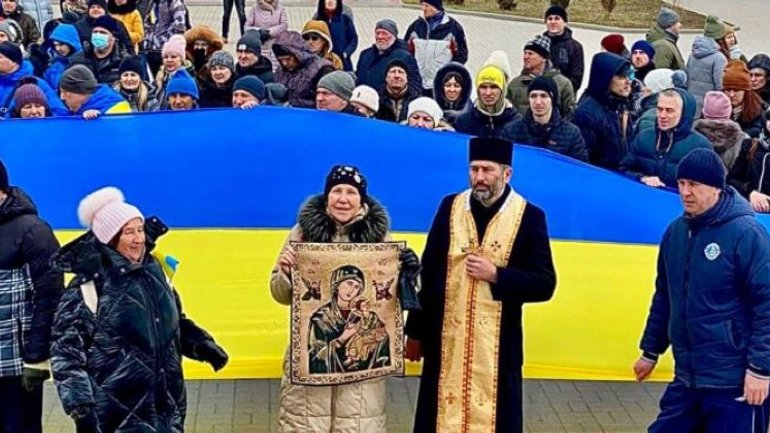Russian invaders abduct two Ukrainian Greek Catholic priests from Berdiansk and accuse them of ‘terrorism’

By Halya Coynash
Citing local residents, the Ukrainian website Forpost Zaporizhzhia reported on 18 November that Father Ivan Levytskyy had been abducted, and that a ‘search’ had been carried out of the church premises on 17 November. Other media suggest that the abduction itself was a day earlier, on 16 November. Father Ivan had taken part in pro-Ukrainian demonstrations until the invaders banned such peaceful protest, and had continued, following the ban, to pray each day at 12 o’clock at the ‘I love Berdiansk’ installation. Such a clear pro-Ukrainian position would have made him a typical target for the invaders, and this was not, furthermore, the first abduction by the Russians of members of religious communities in occupied Berdiansk. Forpost notes that the whereabouts are still unknown of the Head of the Lutheran Church in Berdiansk, Artur Kozhevnikov, following his abduction in April. In March, Oleh Nikolaiev, a priest from the Orthodox Church of Ukraine, was also abducted.
It was only on 24 November that there was any confirmation that both Ukrainian Greek Catholic priests were in Russian custody. Russian propaganda media, including TV Zvezda, a channel linked with Russia’s defence ministry, and Izvestia, claimed that “Rosgvardia had detained Ukrainian priests who were discovered to have explosives, detonators and pistols”.
It is, doubtless, no coincidence that the reports in the Russian state media of this alleged ‘discovery’ came two days after Ukraine’s Security Service carried out a search of the Pechersk Lavra in Kyiv. The latter is under the control of the Ukrainian Orthodox Church under the Moscow Patriarchate and there were legitimate grounds for suspecting that the clergy at the Lavra were, like the Moscow Patriarchate, actively supporting Russia’s war against Ukraine. There was no attempt to hide these investigative measures, nor had anybody been abducted days earlier.
The TV Zvezda material claims that ‘Security service officers’ found a stash of ammunition and explosives, as well as a library of so-called “prohibited literature”. It is alleged that Father Ivan had gone from praying for peace to calling on people “to sabotage the activities of the administration and to resist the Russian military. He also held prayers in support of the Ukrainian army and the Ukrainian regime.”
The video report is anything but convincing. It is asserted that the ‘search’ was prompted by “the priest’s sermons on the central square”, with a masked ‘officer’ claiming that it was “later established” that he had called for the above ‘sabotage’ and ‘resistance’. Even had he done so, in a city invaded and occupied by armed Russians, such calls would be very far removed from a stash of explosives and weapons. Even if the items pointed to are genuinely explosives, etc., there is nothing to prove that they were indeed found in the church basement, and not brought there for the video.
Father Ivan’s voice and appearance give strong grounds for fearing that the Russians have used their usual methods of torture to obtain such video footage. There is not, however, any supposed ‘confession’. On the contrary, Father Ivan states clearly that he was not present during this alleged ‘search’ and cannot therefore comment on the claimed discovery.
The propaganda material on TV Zvezda and numerous other Russian sites say that, at present, “it is unclear whether the priests themselves were planning a terrorist attack, or whether the church was merely a place for storing weapons.”
In a statement on 25 November, the Press Service of the Ukrainian Greek Catholic Donetsk Diocese demanded the immediate release of both Hieromonk Ivan Levytskyy, and Father Bohdan Heleta. They dismiss any claims that the men were involved in ‘subversive’ or ‘partisan’ activities, and state that both were serving the local congregation in their religious capacity. The Press Service points out that both men had been taken prisoner before the search of the church and adjacent buildings “and were in no way able to monitor the given premises, nor the actions of the Rosgvardia men. They cannot bear any liability for the weapons and ammunition alleged to have been found there. This is overt defamation and false accusations.”
The statement also alludes to the claims by TV Zvezda and other propaganda media about the so-called ‘prohibited literature’, with the propaganda sites’ assertion being that there were a huge number of books about the Ukrainian Insurgent Army and “literature of priests who served the Nazi regime”.
Such claims, the Press Service states, can “arouse only shock and bemusement from anyone with at least a superficial knowledge of European history in the twentieth century. Such an analysis can only and solely be viewed as either an inept journalist joke, or as a cheap method of deliberately seek to discredit priests of the Ukrainian Greek Catholic Church in the style of the most primitive defamation against our Church by the godless communist regime of the former USSR. Such methods were used then by the state security bodies for the physical elimination of bishops, priests and believers during the period of the Second World War right up to the collapse of the Soviet Union.”
The statement also points to the fact that these allegations appeared only after Ukraine’s Security Service carried out searches at the Kyiv Pechersk Lavra. This demonstrates not only that further terror is planned against the abducted priests, but that in occupied parts of southern Ukraine the Russian occupation regime is applying the methods of the Bolshevik security service.
As the statement says, maximum publicity for this shocking abduction and likely planned show trial is vital.









